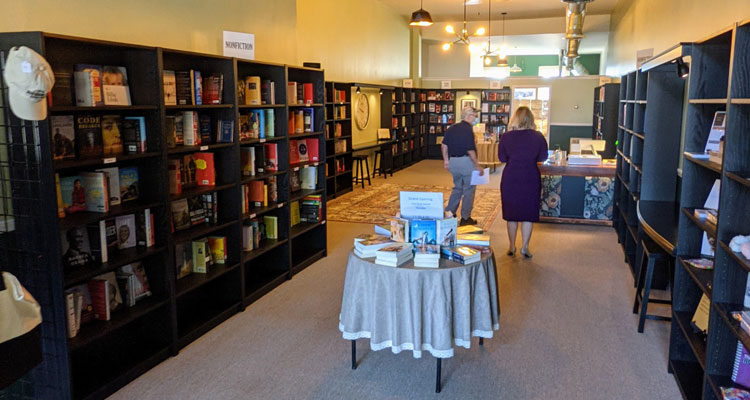You’ve heard of shopping local, but how about reading local?
In a time when local businesses face many challenges, from e-books to competition from big- box stores to the pandemic, one type of business that is maintaining its place in the local market is the independent bookstore. Once a staple of any community and a peaceful place to get lost in a story, small bookstores are quietly making a comeback.
“Bookstores do a lot to promote literacy,” said DeShanta Hairston, owner/operator of Books and Crannies in Martinsville. “By their mere presence, a local bookstore brings many people in the community together.”
While online book retailers are dominating the literary market these days–Amazon began its global empire mostly by selling books online–there’s an important distinction to make between such e-commerce retailers and bookstore owners. Online stores are there to sell books, but they can’t do things like make recommendations, answer questions, or offer opinions to customers.
“Honestly, I think people like the individuality of independent bookshops,” said Catherine Carter, owner of the Dog-Eared Page in Danville. “I’ve never been to two that look the same. And there’s a uniqueness to it that Barnes and Noble or Amazon just does not have.”
Local stores offer a quiet place to read, talk books, and connect with other bibliophiles.
“Obviously, there’s a social component that’s involved,” Carter said. “Most of my customers enjoy our chats when they come into the shop, and Jeff Bezos is surely not going to be providing that, neither will Barnes.”
“My customers know to expect me (most of the time anyway), and I’ve been able to form individual relationships with most of my regulars, which is not something that larger retailers can provide,” she added.
As Carter said, it’s about more than providing large stacks of books. A book shop that has specific clientele provides specific reading materials to suit them.
“Our books are carefully curated to meet the needs and wants of our community, because we know what our community is reading,” Carter said. “My customers know coming in that what we have on the shelves was chosen for them.”
In addition, local bookstores have other benefits to the community at large. According to an article by the Author Learning Center, local bookstores serve as a catalyst for economic growth, provide a hub for new readers and writers, and serve as a focal point for community life.
Even with the pandemic, Carter said she does her best to accommodate readers who come in. She offers virtual versions of the store’s events and tries “to be mindful of each person’s preferences when they come in the shop” regarding masks and social distancing.
The economic benefits to local shops are also palpable. According to data on Indie Bound’s website, an independent bookstore recirculates 28 percent of its money into the local economy, compared to 4 percent by Amazon. Local bookstores also benefit the economy by keeping sales tax dollars in the local community.
They also help the environment by conserving fuel used in shipping and packaging—bringing home a book in a bag from the local store is cheaper and more efficient than having it delivered in a padded box—or reading it on a screen. “I was actually kind of shocked when I first opened to see I was gaining customers of all kinds,” Carter said. “Yes, some of my customers admit to loving their Kindle, but most of them from every generation seem to love the ink on paper, and I, for one, am grat
